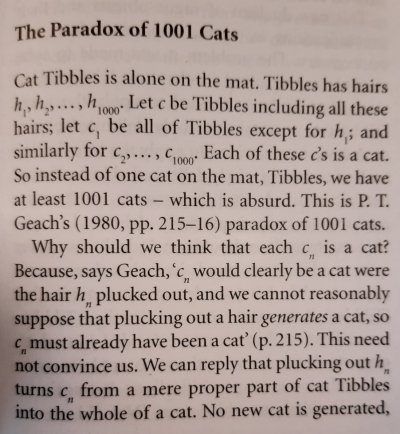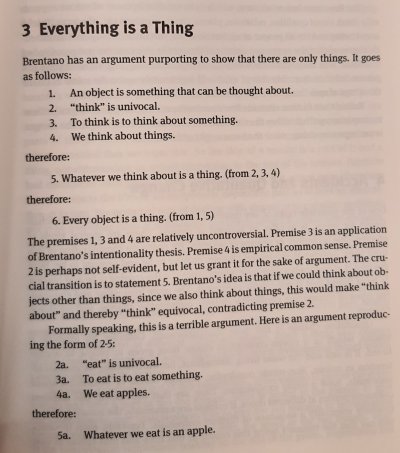uair01
Antediluvian
- Joined
- Apr 12, 2005
- Messages
- 6,427
- Location
- The Netherlands
Because we have no thread on it yet (but we have some metaphysicians) I decided to find and list some of the weirdest metaphysics I could remember. I will be delighted if you do better than I 
The weirdest examples:
The weirdest examples:
- Some theories suggest that space is not an objective feature of reality, but rather a relational property that emerges from the interactions of physical objects. (My favorite.)
- Some theories suggest that existence is not a simple binary distinction between what exists and what does not exist, but rather a complex and multi-dimensional phenomenon that requires a more nuanced understanding. Some theories suggest that non-existence is not simply the absence of existence, but rather a positive and meaningful aspect of reality that is necessary for the existence of other things. (Also: ghosts
)
- Panpsychism is the view that consciousness is a fundamental aspect of the universe, and is present in all things, even inanimate objects. Also: Hegel thought the world is ultimately a self-realizing process of becoming.
- Idealism is the view that reality is fundamentally mental or spiritual in nature, and that the physical world is ultimately an illusion or projection of the mind. (See: Tulpas
) There are some metaphysical theories that suggest that human ideas or mental states can have a direct effect on physical objects. Arthur Schopenhauer believed in "the will", an irrational and insatiable force that drives all of reality.
- Also: In Buddhism, a tulpa is a thought-form or mental construct that is created through meditation and visualization. In economics, speculative value is the value of an asset that is based on expectations of future performance, rather than its intrinsic value or current market price. Both involve the creation of a reality that is not directly tied to the physical world. Both concepts involve the power of imagination and belief.
- The view that time is not a linear flow from past to present to future, but rather a static and unchanging block in which all events exist simultaneously.
- Non-locality is the view that objects can be connected in a way that defies conventional notions of space and time, allowing for instantaneous communication and influence across vast distances. (Quantum physics etc.) Also: Quantum entanglement is a phenomenon in which two particles can become connected in a way that defies conventional notions of space and time, allowing for instantaneous communication and influence across vast distances.
- Solipsism is the view that the only thing that can be known for certain is one's own existence, and that everything else is uncertain or unknowable.
- Ontological mathematics is a controversial theory that suggests that mathematics is not just a tool for describing the world, but is in fact the underlying substance of reality itself. https://www.iamhyperian.com/ontologicalmathematics/
- Immanuel Kant made a distinction between the world of appearances (phenomena), which we can experience and understand through our senses and concepts, and the world beyond appearances (noumena), which we cannot directly access or know.
- The total algorithmic content of human language refers to the extent to which human language can be understood and processed by machines using algorithms. Semantic dimensions of language refer to the underlying concepts or meanings that are conveyed by words and phrases in a language. There is ongoing debate in linguistics and related fields about the number of dimensions that are necessary to map all human language.
- A personal favourite philosopher:
- Markus Gabriel argues that there are multiple "fields of meaning" that exist beyond our individual consciousness, each with its own distinct ontological status and range of significance. These fields of meaning include, for example, the field of ethics, the field of science, and the field of art. He argues that the nature of reality is inherently pluralistic, and that each field of meaning has its own distinct way of interpreting and making sense of the world.
- Another personal favourite philosopher:
- Crazyism about X is the view that something that it would be crazy to believe must be among the core truths about X. In this essay, I argue that crazyism is true of the metaphysics of mind. A position is “crazy” in the intended sense if it is contrary to common sense and we are not epistemically compelled to believe it. http://www.faculty.ucr.edu/~eschwitz/SchwitzAbs/CrazyMind.htm
- In this book, I argue that the world is fundamentally weird. By this I mean that with regard to foundational matters in cosmology, metaphysics, and philosophy of mind, one or another of various bizarre possibilities must be true, but our best science and philosophy don't put us in a position to know which of those bizarre possibilities is in fact correct. https://faculty.ucr.edu/~eschwitz/SchwitzAbs/Weirdness.htm
- Philosophers have debated whether time is an objective feature of reality or merely a subjective construct of human experience.
- Some theories suggest that consciousness is a fundamental aspect of reality, while others suggest it is an emergent property of complex systems. Also: Some theories in metaphysics suggest that there is a universal consciousness or awareness that underlies all of reality, and that individual consciousness is a manifestation of this larger, cosmic consciousness.
- Some theories suggest that reality is fundamentally subjective, while others suggest that it is an objective feature of the universe.
- Some theories suggest that free will is an illusion, while others suggest that it is a fundamental aspect of human experience. (Sabine Hossenfelder does not believe in free will, due to laws of physics.) Also: Determinism is the view that all events, including human actions, are ultimately determined by prior causes and are therefore not truly free or autonomous.
- Some theories suggest that identity is not a fixed and objective feature of reality, but rather a fluid and constantly evolving aspect of human experience.
- Some theories in metaphysics suggest the existence of multiple universes, each with its own set of physical laws and properties.
- Simulation theory is the view that our entire reality is a computer simulation created by some advanced civilization, and that what we perceive as physical reality is actually a digital construct.
- The anthropic principle is the view that the universe is finely tuned to allow for the existence of intelligent life, and that this is evidence of some underlying purpose or design in the universe.
- Time travel is a popular topic in science fiction, but some theories in metaphysics suggest that it may be possible in reality.
Last edited:



